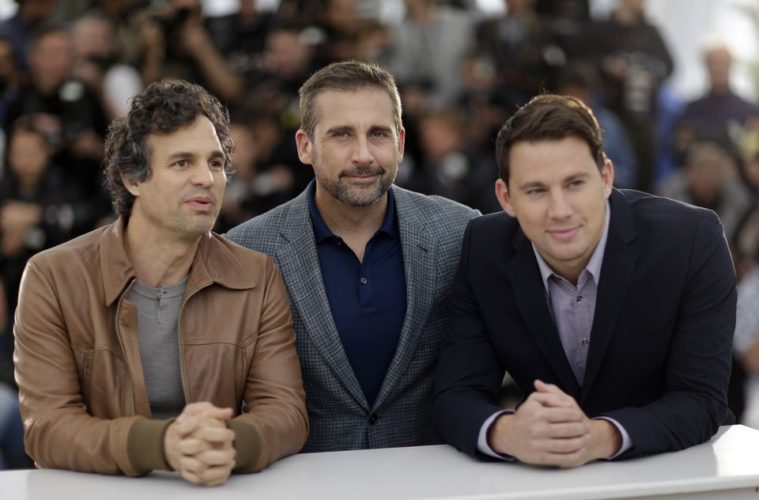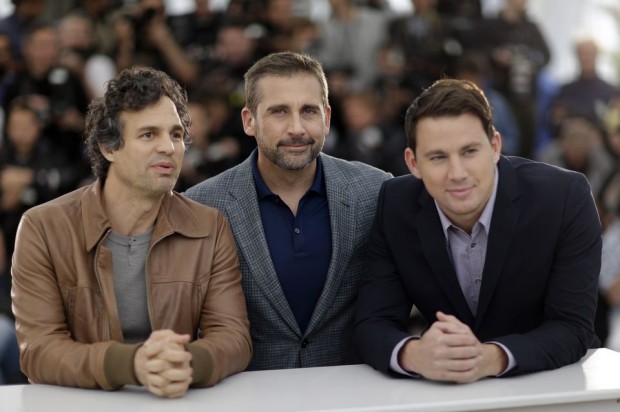
After the successful biographical films Capote and Moneyball director Bennett Miller has debuted his third feature, Foxcatcher, at Cannes Film Festival. The drama tells the true story of American Olympic medalist wrestler Mark Schultz, played by Channing Tatum, focusing on the years when he joined “Team Foxcatcher,” owned by a millionaire John du Pont (brilliantly played by Steve Carell). Taking us into the dark and uncomfortable places of Mark Schultz’s journey, our review said, “there is an unspoken emptiness that hangs boldly over Foxcatcher, which is sure to be one of the subtly darkest films made by a major Hollywood studio this year.”
Ahead of the premiere, stars Channing Tatum, Steve Carell, Mark Ruffalo (playing Mark Schultz’s brother, Dave Schultz), as well as director Bennet Miller with producers Megan Ellison and Jon Kilik, all gathered for a press conference to discuss film’s extraordinary story, preparation for the roles, and much more. Check out the highlights below, as well as the first poster, a trailer, and the complete press conference.
On the Working With the Schultz Family
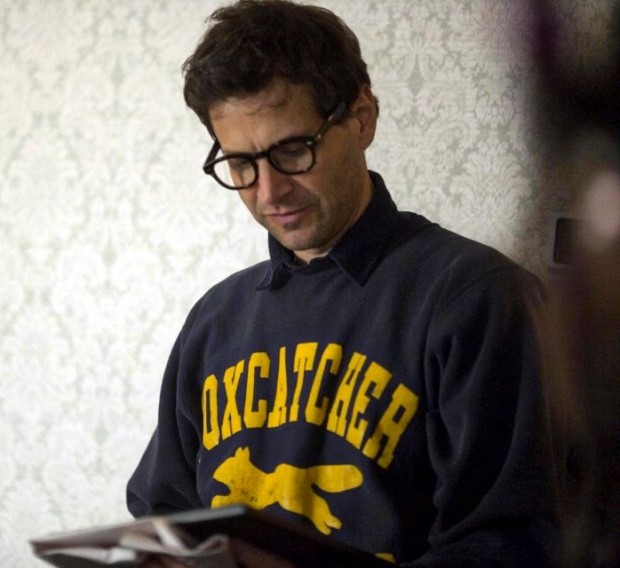 If one doesn’t know the details of the true story, perhaps it’s better left to find out upon release, but the cast and crew discussed their relationship with the Schultz family when preparing for the film. Miller says, “We had a little bit of contact with some members of the family before shooting, but no contact since.” Tatum added, “We prepared pretty intensely. I think we wrestled for about five to six months before, and Mark and I both have cauliflower ear as take home presents from it and bad knees. It was definitely something that gets into your body and doesn’t leave in a good way.”
If one doesn’t know the details of the true story, perhaps it’s better left to find out upon release, but the cast and crew discussed their relationship with the Schultz family when preparing for the film. Miller says, “We had a little bit of contact with some members of the family before shooting, but no contact since.” Tatum added, “We prepared pretty intensely. I think we wrestled for about five to six months before, and Mark and I both have cauliflower ear as take home presents from it and bad knees. It was definitely something that gets into your body and doesn’t leave in a good way.”
Ruffalo opened up about his experience, saying, “We wrestled a lot with some real world-class wrestlers and we got to spend some time with the family and friends of the Schultz’s and Bennett asked us to really immerse ourselves in that world. So our life became wrestling, eating, sleeping, and finding out about who these people were who we were playing.”
As for Tatum, it was more difficult when it came time to shooting. The actor said that Mark Schultz “definitely coached me early in the movie, as far as wrestling-wise and then when he was on set, it was such a polarizing thing. At times, I was so thankful and grateful that he was there, and at other times, I was completely terrified — and I don’t want to say distracted — but when you’re looking off-camera and the person you’re playing is there…it can be….” Miller jumped in, saying, “He was only there for a couple of days and I said, ‘Channing, are you OK with this?’ And he’s like, ‘Yeah, yeah, yeah, yeah.’ And I noticed his struggling a little bit. I talked with Mark Schultz and said, “I think Channing just needs a little bit of space right now.” And he gave it to us.”
“Having Mark there, it was emotionally also very intense because he was sort of reliving a difficult time for him,” Ruffalo says. “So I think it was as hard as him too as it was on all of us. You go through a bad time once and then you have to go through it again on a movie set. It’s a little heavy.”
Carell had a different experience, considering it impossible him to speak to the person he was embodying, but he still felt that duty for veracity. “I think there was a responsibility to the participants. I think there was free hand to a certain degree, but I watched a much as I could, I read as much as I could about him and tried to gain a semblance as to the kind of person he was,” the actor says. “But he wasn’t sitting off camera, watching me portray him, so I didn’t have that looming over my should.”
On Investigative Journalism as Preparation and Being 50% Spontaneous
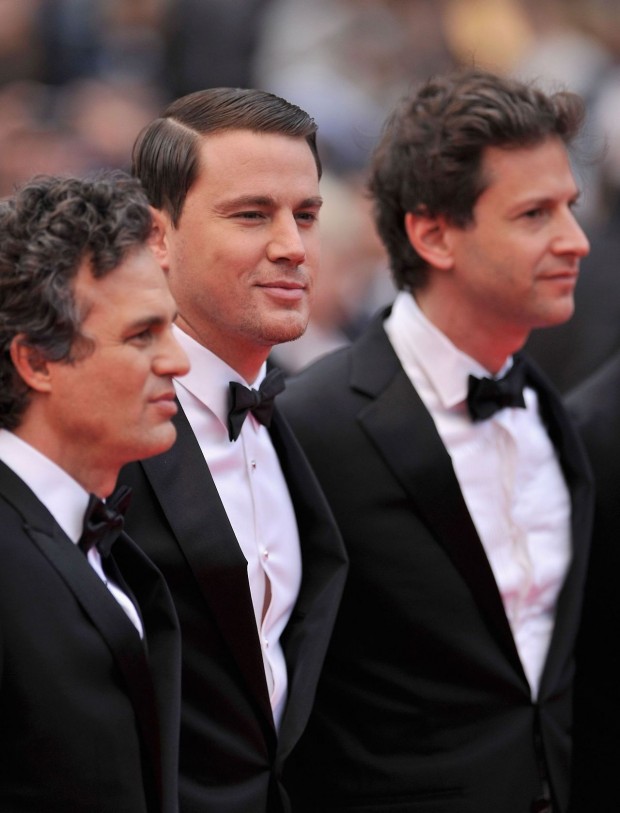 Diving deeper into their preparation, Ruffalo says, “Very early on I met one of Dave’s closest friends who was living on Foxcatcher with him for six years. He really became my sort of guide and technical advisor. We also became very friendly with Nancy Schultz and her children. We were all sort exploring the whole time, this seven months of preparation with this people, and Bennett was inviting us to bring in stories and sort of reflections or epiphanies about these people as it related to the story, as well. We were sort of an on an investigative journalism sort of approach to telling the story.”
Diving deeper into their preparation, Ruffalo says, “Very early on I met one of Dave’s closest friends who was living on Foxcatcher with him for six years. He really became my sort of guide and technical advisor. We also became very friendly with Nancy Schultz and her children. We were all sort exploring the whole time, this seven months of preparation with this people, and Bennett was inviting us to bring in stories and sort of reflections or epiphanies about these people as it related to the story, as well. We were sort of an on an investigative journalism sort of approach to telling the story.”
Miller adds, “It really was an exploration. There were no real dots to connect, specifically. We did not know where dots were. We knew the soul of the thing that was looking to be incarnated, but day to day, we didn’t know that was going happen. So the amount of research that these guys did and the ether of this place, which was the environment that was created with so many people who had vital roles in this story, who were down there with us caring about the veracity of this story, and these guys living it and breathing it, were invited to go off-road for quite a bit of the film. I haven’t done the math, but I’m going to say easily more than 50% was spontaneous and another large chunk came before or the morning of. Quite a bit was just stuff they learned along the way and were able to speak for these characters.”
On Getting the Perfect Location
While it was impossible to shoot on the original estate, Miller says, “I’d wanted to shoot in du Pont country, New Town Square on the mainline outside Philadelphia, but circumstances pushed up a little bit west to the Pittsburgh area. We did get lucky that another family — I’m not permitted to say which, but a du Pont-type family in terms of their history and wealth — invited us on to their 17,000 acre estate and horse ranch, which had an amazing resemblance to Foxcatcher Farms. They had never permitted any outsiders to even photograph it before. Amazingly, we got a meeting and we sat around a table with characters who could have been in the movie and we told them what we were trying to do and asked for their support. They had all seen Moneyball several times and they said, ‘Yeah, we’d love to have you do this.’ It was the most inexpensive location on the movie and one that money could not have bought.”
On the Power and Importance of Silence and Not Telling a Story
When asked about his approach of using silence to convey specific emotions, Miller says, “I think that the style of this film, and my other films, is not so much telling a story, but observing a story. I try to create a context that will sensitize you to what’s happening beneath the story. Because there’s a lot of American male repressed noncommunication happening in this film. There’s an undercurrent beneath the undercurrent and every scene is just the tip of the iceberg. So the sound is one component that attempts to sensitize you. Sometimes it pulls back as a means to pull you in and hopefully it makes you look at listen and see what otherwise you might not have. But also it’s an adventure, the film, really Mark’s adventure. It’s a tour through these moods and temperatures and colors. I think sound is one of the most under-appreciated and often unexploited art forms within the many art forms that make up a film.”
On the Casting of Steve Carell
In an emotional moment for Bennett Miller, Chaz Ebert asked the question of how he fosters such brilliant performances from his actors, specifically Carell in this film. After a long pause, the director said, “I’m avoiding your question because it makes me emotional because the last time I saw you I was more emotional than I ever wanted to be in front of people.” He added, “To work with actors, all of these guys and of course Phil[ip Seymour Hoffman] who are willing to put faith in you, you have to be grateful for the rest of your life. Steve obviously doesn’t resemble anything he had done before and I’ll tell you, it was so far out of his comfort zone. But we met, and we just talked about the character, but truthfully I had never seen Steve do anything that would give any material evidence that he could do this. But we just chatted and I heard how he thought and how he was thinking about the character. I had a vision for it working and I just thought he can do it and he will commit himself to doing it and it might hurt but it will get there. I really can not imagine anyone doing any of these roles except for these guys.”
On Carrying Through Miller’s Vision
In what’s easily his most dramatic work, Carell discussed how clearly Miller’s initial plans carried through. “The first time we met Bennett described various scenes in the film as to how he envisioned them — and it’s the first time that I ever experienced this — that the final product was exactly how he described it to me,” the actor says. “Tonally, it was exactly what he described. Sometimes it was a very circuitous route to get there but it was astonishing to me — and this was years ago — that all of those components came together and all of the people that were cast were exactly what was reflected on the page.”
Carell added, “You can do all sorts of research and listening to someone’s voice and watching them and glean some sense of who they are but I think ultimately you forget all about that when you start to shoot. And if you’ve rehearsed enough, it’s inside of you as you’re doing it. None of it felt like an acting exercise as we were going through it. None of it felt like we need to do something with this particular moment. It was a different experience altogether and I credit Bennett with that.” Miller says, “And I credit the actors,” while Carell adds with a laugh, “And we all credit the producers.”
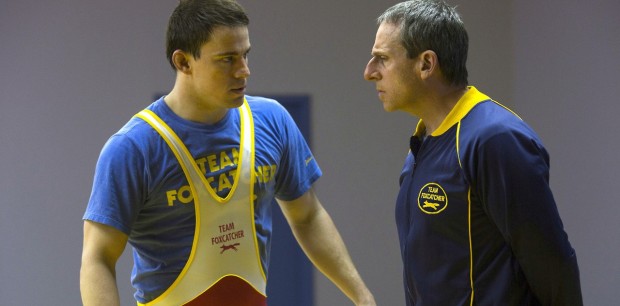
On the Morality of the Film
When asked about the themes of the film, Miller first discussed his experience with the story. “It was so bizarre,” he says. “I mean, I had never personally encountered anything that resembled any of this behavior, much less wrestling or such a patrician family or the cultures within, and what happened was so bizarre and absurdist and sometimes comical and ultimately horrible, that I had never experienced any of that and yet it felt very familiar. Within this story there were themes that seemed much larger than the story. Because I really do care about these characters and this story, that’s where the attention goes, but I can relate it to the world that we live in, our country, but I do not want to venture out and make a comment about it. It’s not a political film. The film itself does not take a moral position so much as its meant to be an investigation and an attempt to understand and feel some of these dynamics. Towards this point of decline, yes, that’s what’s happening here and that’s what’s happening on a larger scale too. It’s interesting to take a microscope and look at the interior of the genetics of this thing as it pertains to individuals. One way of understanding the universe is through a microscope and the other is through a telescope. This is the microscopic attempt.”
Ruffalo, however, does believe the drama takes a moral stance, saying, “It did strike me at one point that there is a moral thrust to the story. There’s a Greek tragedy buried in it, what happens when everything has a price tag on it, when everything’s for sale. What happens to talent when it’s for sale or that it can be acquired by a price and what happens to people when they’re in a system that values almost everything at a price. It’s modernity. And so there’s those moments that these people have — really, really, really talented people who can’t really do what they do best in the world unless they can figure out a way, how to monetize it. But it costs them and it costs the talent a great deal. That was a theme that’s interesting today and it’s topical and it’s up for discussion and the great thing about making movies and films is that you can have that kind of discussion in a completely human and relatable way without it being political or polemic of divisive or blaming anybody. It’s just a reflection of how we are and where we are and I really appreciate that we got to do that with this movie and this story.”
“By not concluding anything, and I think we all love to just jump to a conclusion and just take a side, good or bad, but by really staring at it and hopefully in an unflinching way and just keep looking at it,” Miller says. “When you don’t take a side then you see past the thing that you’re confronted with and you just keep looking at it and what’s beyond it and what’s beyond it.”
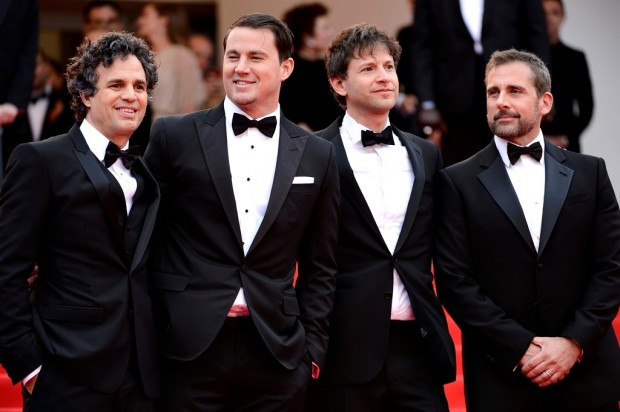
On Adjusting Perfectly Written Scenes
Tatum also opened up about how he threw his preparation process out the window early on. “We’re telling a story and he has this entire life that we can’t fit into 90 minutes. You can obviously take the physical things of the way someone walks or little small eccentricities he has, or the way he thinks, or what not. One of the biggest lessons he learns, from this film specifically is that I think I came in with a plan. This thing prepared and I was really ready. After that first day I felt like I ruined it. I didn’t feel like I did anything right,” Tatum says. “What I realized after it was this isn’t a bard that I was going to jump up and hit and I wasn’t going to score any day. You just keep digging to find the truth in Mark and in the film and what are we doing in each scene. A scene that was written perfectly, we’d do it and we’d be like, ‘Something’s missing.’ And we’d spend hours trying to figure out how we can find it and find the truth in it. You just have to give yourself over to it and just let it come through in all the different stages of what making a movie is and really trusting in the person that’s telling the story.”
On Not Approaching the Film as a Drama
Before he got the role Miller says, “I asked Steve if he could imagine what life would really be like if he did not have the relief of a sense of humor. Not just being funny, but to see humor in things and what would that really be like. I just saw you go to a dark place — and I think all comedians are dark — and say, ‘No, I can not imagine.'” Discussing this genre switch, Carell adds, “I think it’s really the same approach you take to a comedy anyways. Because I don’t think characters in films know they are in a comedy or a drama. I think they are just characters in films. I think the same applied to this. I didn’t approach it as a drama necessarily. It was a story and a character within that story.”
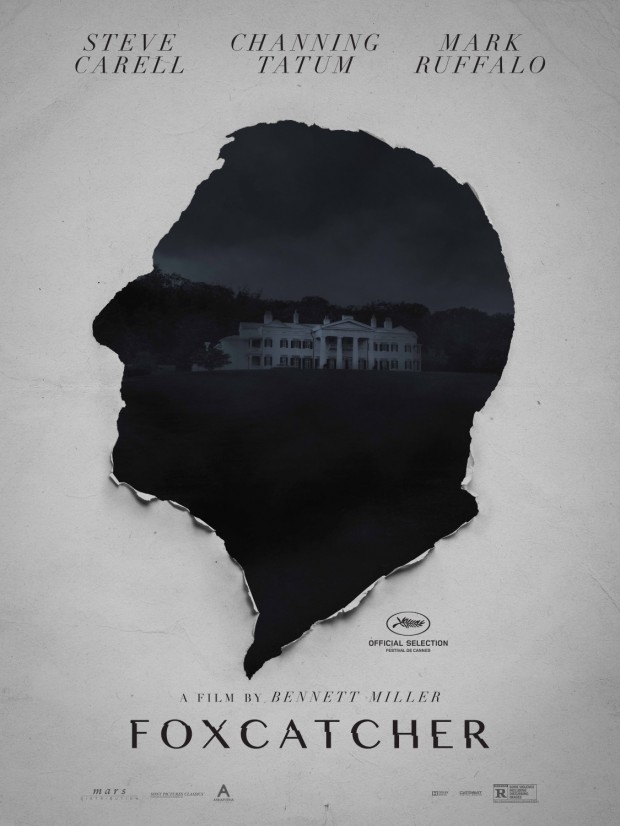
Foxcatcher premiered at Cannes Film Festival and hits theaters on November 14th.

